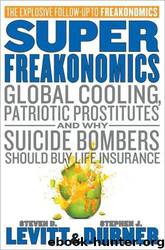Superfreakonomics: global cooling, patriotic prostitutes, and why suicide bombers should buy life insurance by Steven D. Levitt; Stephen J. Dubner

Author:Steven D. Levitt; Stephen J. Dubner
Language: eng
Format: mobi, epub
Tags: Sociological aspects, Social Science, Business, Popular Culture, Economics, Economics - General, Economics (Specific Aspects), General, Economics - Psychological aspects, Popular Culture - General, Psychological aspects, Economics - Sociological aspects, Business & Economics, Finance
ISBN: 9780060889579
Publisher: William Morrow
Published: 2009-10-07T17:24:35.047000+00:00
SuperFreakonomics
CHAPTER 4
THE FIX IS IN—AND IT’S CHEAP AND SIMPLE
It is a fact of life that people love to complain, particularly about how terrible the modern world is compared with the past.
They are nearly always wrong. On just about any dimension you can think of—warfare, crime, income, education, transportation, worker safety, health—the twenty-first century is far more hospitable to the average human than any earlier time.
Consider childbirth. In industrialized nations, the current rate of maternal death during childbirth is 9 women per 100,000 births. Just one hundred years ago, the rate was more than fifty times higher.
One of the gravest threats of childbearing was a condition known as puerperal fever, which was often fatal to both mother and child. During the 1840s, some of the best hospitals in Europe—the London General Lying-in Hospital, the Paris Maternité, the Dresden Maternity Hospital—were plagued by it. Women would arrive healthy at the hospital to deliver a baby and then, shortly thereafter, contract a raging fever and die.
Perhaps the finest hospital at the time was the Allgemeine Krankenhaus, or General Hospital, in Vienna. Between 1841 and 1846, doctors there delivered more than 20,000 babies; nearly 2,000 of the mothers, or 1 of every 10, died. In 1847, the situation worsened: 1 of every 6 mothers died from puerperal fever.
That was the year Ignatz Semmelweis, a young Hungarian-born doctor, became assistant to the director of Vienna General’s maternity clinic. Semmelweis was a sensitive man, very much attuned to the suffering of others, and he was so distraught by the rampant loss of life that he became obsessed with stopping it.
Unlike many sensitive people, Semmelweis was able to put aside emotion and focus on the facts, known and unknown.
The first smart thing he did was acknowledge that doctors really had no idea what caused puerperal fever. They might say they knew, but the exorbitant death rate argued otherwise. A look back at the suspected causes of the fever reveals an array of wild guesses:
“[M]isconduct in the early part of pregnancy, such as tight stays and petticoat bindings, which, together with the weight of the uterus, detain the faeces in the intestines, the thin putrid parts of which are taken up into the blood.”“[A]n atmosphere, a miasma, or…by milk metastasis, lochial suppression, cosmo-telluric influences, personal predisposition…”Foul air in the delivery wards.The presence of male doctors, which perhaps “wounded the modesty of parturient mothers, leading to the pathological change.”“Catching a chill, errors in diet, rising in the labor room too soon after delivery in order to walk back to bed.”
It is interesting to note that the women were generally held to blame. This may have had something to do with the fact that all doctors at the time were male. Although nineteenth-century medicine may seem primitive today, doctors were considered nearly godlike in their wisdom and authority. And yet puerperal fever presented a troubling contradiction: when women delivered babies at home with a midwife, as was still common, they were at least sixty times less likely to die of puerperal fever than if they delivered in a hospital.
Download
Superfreakonomics: global cooling, patriotic prostitutes, and why suicide bombers should buy life insurance by Steven D. Levitt; Stephen J. Dubner.epub
This site does not store any files on its server. We only index and link to content provided by other sites. Please contact the content providers to delete copyright contents if any and email us, we'll remove relevant links or contents immediately.
International Integration of the Brazilian Economy by Elias C. Grivoyannis(74236)
The Radium Girls by Kate Moore(11609)
Turbulence by E. J. Noyes(7690)
Nudge - Improving Decisions about Health, Wealth, and Happiness by Thaler Sunstein(7237)
The Black Swan by Nassim Nicholas Taleb(6754)
Rich Dad Poor Dad by Robert T. Kiyosaki(6170)
Pioneering Portfolio Management by David F. Swensen(6068)
Man-made Catastrophes and Risk Information Concealment by Dmitry Chernov & Didier Sornette(5641)
Zero to One by Peter Thiel(5484)
Secrecy World by Jake Bernstein(4384)
Millionaire: The Philanderer, Gambler, and Duelist Who Invented Modern Finance by Janet Gleeson(4087)
The Age of Surveillance Capitalism by Shoshana Zuboff(3979)
Skin in the Game by Nassim Nicholas Taleb(3964)
The Money Culture by Michael Lewis(3836)
Bullshit Jobs by David Graeber(3823)
Skin in the Game: Hidden Asymmetries in Daily Life by Nassim Nicholas Taleb(3718)
The Dhandho Investor by Mohnish Pabrai(3559)
The Wisdom of Finance by Mihir Desai(3520)
Blockchain Basics by Daniel Drescher(3324)
